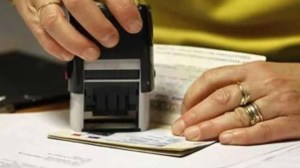US economic and hi-tech curbs under review
NEW DELHI, MARCH 31: Visiting US lawmakers, cutting across party lines, have said they ``understood India's need to go nuclear'' last yea...

NEW DELHI, MARCH 31: Visiting US lawmakers, cutting across party lines, have said they “understood India’s need to go nuclear” last year because of the “linkages” between China and Pakistan, and confirmed that the US Congress was now considering moves to lift economic sanctions against India.
“China is the aggressor, because it has been involved in nuclear proliferation…India, located between China and Pakistan is in a very vulnerable position. I understand India’s decision to test,” Mark Foley, Republican from Florida told the The Indian Express here.
Foley is part of a visiting ten-member US Congressional delegation led by Richard Gephardt, the minority leader in the US House of Representatives and widely considered to be one of the most influential men in Washington.
His colleague from the Opposition, Democrat Nancy Pelosi (from California) echoed his views. China had “violated international agreements” on transferring nuclear and missile technology to Pakistan, Pelosi said, even asit modernised itself, adding that had convinced her that the US administration had “taken a wrong course” on dealing with India and China.
“China receives so much attention from the US government,” Pelosi added bluntly, “because we have a $60 billion trade deficit” with Beijing. She pointed out that the “US had not wanted to offend that regime and chose to look the other way” when China violated its non-proliferation agreements, that “the Bush as well as the Clinton administrations had taken a wrong course”, that it was now time “to have more balance in Asia.”
While Gephardt himself was not as forthcoming as his colleagues on this particular matter, the Democrat leader confirmed that there existed a move in the House to lift sanctions against India, which would give President Clinton the “flexibility” to carry out a long-term waiver.
Briefly speaking to this reporter, Gephardt talked of how Clinton wants to “come very badly to India and this year,” adding that now was the ideal time forthe world’s largest democracies to build on the bedrock values of democracy, freedom and rule of law.
Gephardt’s discovery of India — he is a member of the India Caucus, but this is his first visit here — took him and his delegation today to people as varied as the Principal Secretary to the PM Brajesh Mishra, former Congress finance minister Manmohan Singh, foreign secretary K Raghunath and Defence Minister George Fernandes.
At a lunch hosted by the Confederation of Indian Industry, Gephardt was asked by Indian businessmen about the fate of economic sanctions that have been in place since the tests and which were now hurting the pace of economic reform.
“We are now (in the act of) passing legislation that will give the President the flexibility to do so,” Gephardt said, adding that the Entities List, which proscribes about 200 Indian companies from receiving any technology from the US is also “constantly under review.”
Interestingly, the US lawmakers, who were effusive about the potential ofthe bilateral relationship, also pointed out that India needed to sign the Comprehensive Test Ban Treaty (CTBT) on its own accord and not wait for the US Senate to ratify it first.
“A decision by Prime Minister Vajpayee for India to sign the CTBT would be very well received by the US and the world,” said Gephardt at his CII lunch address, adding, “I hope that as we work together to forge what I hope will be a common security agenda, we can cast aside all impediments to better cooperation and trade between our nations.”
Gephardt, pointed out observers, represents a district in Missouri state, where the McDonnell Douglas aviation company has a huge presence.
Photos





- 01
- 02
- 03
- 04
- 05


























